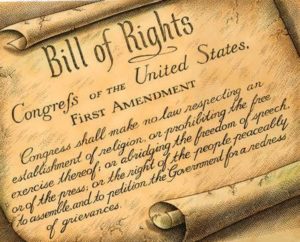
By Sherry DeBoer, Executive Director, S.D. Humanities Council
It is hard to imagine losing the editorial checks and balances that protect our First Amendment rights, our freedom of information.
These rights have been championed throughout history by traditional media outlets, some of whom stood against dictatorial attempts to censor public information. And while the First Amendment is not currently under direct attack, it is indirectly threatened by the potential extinction of traditional media, as digitization continues to divide both our attention spans and our already partisan nation. We must re-establish positive relationships with traditional media.
Bolstered by a grant from the Carnegie Mellon Institution, the South Dakota Humanities Council and the South Dakota Newspaper Association will host a series of “Democracy and the Informed Citizen” public forums this year focused on reinforcing public value for our media.
We must fight for our media the way our media has historically fought for us, such as when the Washington Post battled the Nixon administration to publish the Pentagon Papers in 1971.
At the time, Post Editor Ben Bradlee and publisher Katherine Graham worried about litigation and backlash from President Richard Nixon and the value of their recently offered public shares. But they ultimately reported the ugly truth of the Vietnam War.
The Post decided the public’s right to know what the government was hiding outweighed tangible risks to the paper’s existence. As revenue losses threaten traditional media, we must secure our news ecosystem and its ability to audaciously reveal such wrongdoings. “Democracy and the Informed Citizen” examines the state of news in 2018 and considers ways to move forward as an informed, cohesive democracy.
Traditional media faces an onslaught of new challenges in this frenzied smartphone era: a President who announces his own news via Twitter, accusations of “fake news,” competition from online outlets restrained by neither accountability nor industry standards.
Gaining credibility is no longer as easy as printing a newspaper or broadcasting a signal. Ironically, traditional media outlets are chastised as much as or more than their uncredentialed digital counterparts, some of which earn money by spreading intentional lies. As digital advertising revenue lines the pockets of online publications, newspapers, television and radio stations have no choice but to chase the same online clicks. Meanwhile, truth and accountability trail behind.
By asking “What’s True, What’s False, and What’s Important?” our forums lead us to perhaps the most salient question: how do we know which sources to trust?
During our kickoff event at the University of South Dakota in April, we asked Washington Post editor Martin Baron, a 14-time Pulitzer winner.
The veteran editor’s advice? Think critically.
“If… they’re trying to reinforce your point of view, you should be highly suspicious of those news sources, because …. their purpose is just to tell you that you’re right all the time.”
We’re promoting infoliteracy, a relatively new skill necessitated by our complex digital media era. An infoliterate citizen distinguishes real news from fake news by recognizing and dismissing biased sources.
In 1971, The Post faced factual disputes, as newspapers have since the invention of the printing press, but not the extra layer of mistrust created by “fake news,” which forces readers to sort stories fabricated by agenda-seekers and liars from those written by real reporters.
Graham’s courageous decision to publish led to a Supreme Court decision that the McNamara Report – and its stunning revelation that the government promoted a war it knew was unwinnable – was public property. It also boosted the paper’s reputation.
Democracy depends on us to support news reporting capable of challenging the institutions we depend upon and trust.
We must discern our sources of information.
Ruling in favor of The Post and the New York Times, Supreme Court Justice Potter Stewart wrote: “In the absence of the governmental checks and balances present in other areas of our national life, the only effective restraint upon executive policy and power in the areas of national defense and international affairs may lie in an enlightened citizenry—in an informed and critical public opinion which alone can here protect the values of democratic government.”
We hope the 2018 initiative will encourage citizens to value media institutions that are willing to stake their names and reputations on their reporting, and to be part of the “informed and critical public opinion” that makes our democracy special.
Partnership Bringing Democracy Initiative Programming, Forums
As part of a special partnership created to promote the initiative, SDHC and the South Dakota Newspaper Association will host a series of public forums focusing on public trust and the media. The South Dakota forums will feature Pulitzer Prize-winning authors, current and former journalists, journalism professors and others.
In conjunction with this democracy-themed programming, groups around the state will read and discuss the 2018 One Book South Dakota, “Informing the News: The Need for Knowledge-Based Journalism” by Thomas E. Patterson.
SDHC will also host journalism and social media experts at the South Dakota Festival of Books in September led by Patterson, Pulitzer Prize-winning journalists Timothy Egan and Jacqui Banaszynski, as well as digital storytelling expert Andy Boyle of Axios and Emmy-winning ABC News correspondent Linsey Davis, who files reports for World News, Good Morning America, 20/20 and Nightline.
We urge you to find and attend an event in your area, and to please support your local newspapers.
